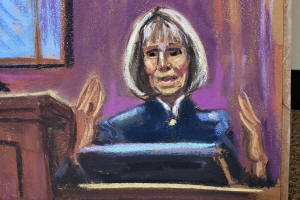Trump accuser defends rape claim after judge rejects Trump's mistrial
request
 Send a link to a friend
Send a link to a friend
 [May 02, 2023]
By Jonathan Stempel and Jack Queen [May 02, 2023]
By Jonathan Stempel and Jack Queen
NEW YORK (Reuters) -E. Jean Carroll, the writer accusing Donald Trump of
rape and defamation, on Monday denied making up her claims to drive
publicity for her memoir.
Testifying in Manhattan federal court after the judge denied Trump's
request for a mistrial, Carroll said she wasn't seeking attention
through appearances on TV and podcasts, while acknowledging they were an
important driver of book sales.
Carroll also resisted efforts by Trump's lawyer Joe Tacopina to show she
experienced no suffering because, as Trump has claimed, the rape did not
happen.
She said she hides her inner suffering in her role as an advice
columnist, and that going to parties related to her lawsuits against
Trump and stating publicly she was doing "fabulous" didn't mean she was
lying about him.
"In this courtroom, I'm being forced to tell the truth," she told
Tacopina on her third and final day of testimony, including two under
cross-examination.
Carroll, 79, says Trump, 76, raped her in a Bergdorf Goodman department
store dressing room in late 1995 or early 1996, and then tarred her
reputation and career by lying about it online.

Her defamation claim concerns an October 2022 post on Trump's Truth
Social platform, where Trump called the former Elle magazine advice
columnist's case a "complete con job" and "a Hoax and a lie."
Carroll used to write for Elle magazine, and is now at Substack.
The rape claim was included in her memoir, "What Do We Need Men For? A
Modest Proposal," excerpts of which were published in New York magazine
in June 2019.
Carroll is seeking unspecified damages in her civil lawsuit.
She is suing Trump separately for defamation after he denied her claims,
using similar language, after the book excerpts were published.

Trump has not attended the trial, now in its fourth day. On Monday, he
was in Scotland to visit his golf courses there.
TRUMP LAWYER SEEKS MISTRIAL, ACCUSES JUDGE OF BIAS
In seeking a mistrial, Tacopina sent an 18-page letter early on Monday
accusing U.S. District Judge Lewis Kaplan of bias against Trump.
Tacopina said several "unfair and prejudicial" rulings by Kaplan
reflected a "deeper leaning" toward Carroll, including comments where
the judge "openly expresses favoritism."
Trump is leading the Republican field in the 2024 presidential race.
Tacopina said Kaplan, an appointee of Democratic President Bill Clinton,
should have let him question Carroll about why she did not seek security
camera footage of the alleged rape.
[to top of second column]
|

Former Elle magazine advice columnist E.
Jean Carroll answers questions by Joe Tacopina, lawyer of former
U.S. President Donald Trump, during a civil trial where Carroll
accuses the former U.S. president in a civil lawsuit of raping her
in a department store dressing room in the mid-1990s, and of
defamation, in New York, U.S., May 1, 2023 in this courtroom sketch.
REUTERS/Jane Rosenberg

He also challenged Kaplan's statement that Trump might be "sailing
in harm's way" after his son Eric Trump discussed on Twitter how
LinkedIn co-founder Reid Hoffman was helping fund Carroll's case.
Kaplan ruled last Wednesday that Trump's lawyers could not mention
Hoffman at the trial, calling it "unfairly prejudicial."
Requests for mistrials often fail, but form a basis for eventual
appeals.
Because Carroll's case is civil, she must establish her claims by a
preponderance of the evidence, meaning more likely than not, and
need not meet the tougher criminal standard of proof beyond a
reasonable doubt.
ASHAMED AT FIRST TO COME FORWARD, CARROLL SAYS
Carroll had told jurors last Wednesday that Trump put his fingers
into her vagina, which she called "extremely painful, extremely
painful," and then inserted his penis.
In Monday's cross-examination, Carroll acknowledged not following
her own advice to readers that they tell police if they are crime
victims, after Tacopina questioned why she did not after
encountering Trump.
"Listen, I was ashamed of what happened," Carroll said. "I thought
it was my fault."
She said it was not until 2017, when the #MeToo movement began, that
she finally began to "realize some really terrible things that I did
not want to face."
Tacopina asked why Carroll did not sue former CBS chief executive
Les Moonves for defamation after he publicly denied her claim in her
memoir that he once tried to sexually assault her.
Carroll responded that Moonves' denial was more straightforward than
Trump's.
"He didn't grind my face into the mud the way Donald Trump did,"
Carroll said.
Trump's lawyers have not said publicly whether he plans to testify.
They have identified only one possible defense witness, the
psychiatrist Edgar Nace, other than Trump.
Testimony is expected to resume on Tuesday.
Carroll's witness list includes two friends with whom she spoke
shortly after the alleged rape, two other women who have said Trump
assaulted them, and a professor who could help jurors estimate
Carroll's damages.
Several women have accused Trump of sexual misconduct. He has denied
their allegations.
(Reporting by Jack Queen and Jonathan Stempel in New York, Editing
by Nick Zieminski and Howard Goller)
[© 2023 Thomson Reuters. All rights
reserved.]This material may not be published,
broadcast, rewritten or redistributed.
Thompson Reuters is solely responsible for this content. |